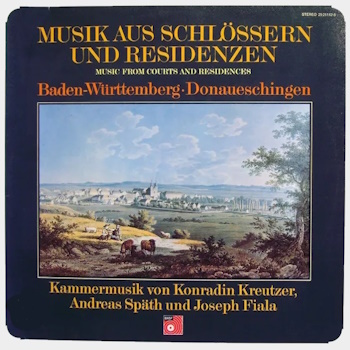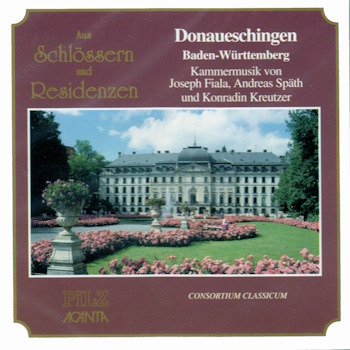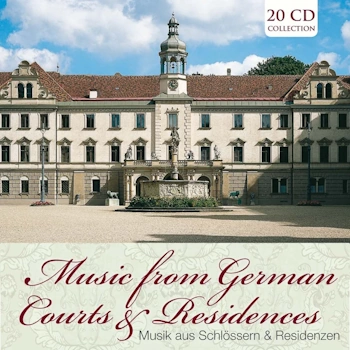 |
|
2 LPs
- 29 21142-8 - (p) 1972
|
 |
| 2 CDs -
44 2178-2 - (c) 1993 |
|
BADEN-WÜRTTEMBERG
DONAUESCHINGEN
|
|
|
|
|
|
|
|
| Andreas SPÄTH
(1790-1876) |
Nonett
für 2 Violinen, Viola, Violoncello
und Kontrabaß, Oboe, Klarinette,
Horn und Fagott |
LP 1 |
|
26' 11" |
|
|
-
Allegro con spirito |
|
6' 58" |
|
A1 |
|
-
Poco Adagio quasi Andante |
|
9' 14" |
|
A2 |
|
-
Molto vivace
|
|
4' 52" |
|
A3 |
|
-
Vivace |
|
5' 07" |
|
B1 |
| Joseph FIALA (um
1754-1816) |
Quartett
für Oboe, Violine, Viola und
Violoncello |
LP 1 |
|
13' 54" |
|
|
-
Allegro spirituoso
|
|
4' 31" |
|
B1 |
|
-
Menuetto
|
|
2' 37" |
|
B1 |
|
-
Andante |
|
2' 54" |
|
B1 |
|
-
Allegro |
|
3' 52" |
|
B1 |
| Konradin KREUTZER
(1780-1849) |
Quintett
für Klavier, Flöte, Klarinette,
Viola und Violoncello |
LP 2 |
|
29' 29" |
|
|
-
Allegro maestoso
|
|
8' 00" |
|
C1 |
|
-
Adagio
|
|
6' 20" |
|
C2 |
|
-
Scherzo molto vivace
|
|
6' 06" |
|
C3 |
|
-
Tempo di Polonaise
|
|
9' 03" |
|
D1 |
| Konradin KREUTZER |
Quartett
für Klarinette, Violine, Viola und
Violoncello |
LP 2 |
|
12' 43" |
|
|
-
Allegro
|
|
4' 45" |
|
D2 |
|
-
Andante grazioso
|
|
3' 26" |
|
D3 |
|
-
Rondo: Allegro moderato |
|
4' 32" |
|
D4 |
|
|
|
|
Andreas
SPÄTH: Nonett
|
Andreas
SPÄTH: Quartett
|
Konradin
KREUTZER: Quintett
|
Konradin
KREUTZER: Quartett
|
|
|
|
|
Consortium
Classicum
|
Consortium
Classicum
|
Consortium
Classicum
|
Consortium
Classicum
|
- Rainer Kußmaul, Violine
|
- Gernot Schmalfuß, Oboe
|
- Werner Genuit, Klavier
|
- Dieter Klocker, Klarinette
|
| - Jacques Holtman, Violine |
- Rainer Kußmaul, Violine
|
- Franz Vester, Flöte
|
- Rainer Kußmaul, Violine
|
| - Jürgen Kußmaul, Viola |
- Jürgen Kußmaul, Viola
|
- Dieter Klocker, Klarinette
|
- Jürgen Kußmaul, Viola
|
| - Anner Bylsma, Violoncello |
- Anner Bylsma, Violoncello
|
- Jürgen Kußmaul, Viola
|
- Anner Bylsma, Violoncello
|
| - Walter Meuter, Kontrabaß |
|
- Anner Bylsma, Violoncello
|
|
| - Gernot Schmalfuß, Oboe |
|
|
|
| - Dieter Klocker, Klarinette |
|
|
|
| - Werner Meyendorf, Horn |
|
|
|
| - Karl-Otto Hartmann,
Fagott |
|
|
|
|
|
|
|
Recorded
at: |
|
-
|
|
|
Live / Studio
|
|
Studio |
|
|
Producer |
|
-
|
|
|
Balance engineer
|
|
-
|
|
|
First LP Edition
|
|
BASF
| 29 21142-8 | 2 LPs | durata
40' 07" - 42' 12" | (p)
1972
|
|
|
First CD Edition |
|
PILZ
- ACANTA | 44 2178-2 | 2 CDs |
durata 40' 07" - 42' 12" | (c)
1993 | ADD
|
|
|
Note |
|
-
|
|
|
|
|
Musik
aus Schlössernb &
Residenzen
(20 CD Collection)

Membran |
234355 | (c) 2016
(in CD 1
& 2)
|
Few
courts in southern Germany have
such a fine musical tradition as
the Court of Donaueschingen.
This rather sleepy residence of
the Princes of Fürstenberg
serves as a model for
unconventional and
unbureaucratic music-making.
During the second half of the
18th century and the first half
of the 19th century the court
orchestra there enjoyed a high
standard of achievement, and
since 1921 Donaueschingen has
been a favourite centre for
contemporary music.
Whereas during the Renaissance
and Baroque periods the music of
this court was only of
significance locally, the
establishing, around 1762, of a
proper court orchestra under the
patronage of Prince Joseph
Wenzel, himself a good pianist
and cellist, saw the advent of a
musical era that was to flourish
right up to the death of Prince
Karl Egon II in 1853. Each week
at the palace three concerts of
chamber music were given in
which artists of international
fame often took part. In 1766,
for instance, Leopold Mozart and
his children performed there.
Unfortunately the works for
violoncello which Mozart had to
write under the watchful eye of
the Prince have been lost. The
court’s connection with the
Mozart family was kept up for a
long time. As late as 1786
Mozart sent the Prince a list of
his „latest births“, at the same
time offering his services as
court composer. Up until this
time the repertoire of the court
orchestra had consisted mainly
of works by masters of the
Mannheim and Viennese schools,
and a few by Bohemian composers.
From 1789 onwards the music at
the court was in the hands of
Karl Joseph von Hampeln, a
concert violinist and quartet
player from Munich. It was he
who managed to procure the
services of several
distinguished performers and
composers. Among them was, for
example, the oboist and composer
Joseph Fiala, whom Mozart
regarded very highly. „An
adornment to the orchestra“,
Kala was employed at
Donaueschingen from 1792 as
oboist, cellist and viol player.
Mozart had made his acquaintance
in Munich in 1777 at a concert
of music for wind instruments,
and said of him: „One can easily
tell they have been trained by
Kala. They played some of his
pieces, and I must say they are
really attractive. He has good
ideas.“
Fiala, for his part, admired
Mozart’s works tremendously.
Leopold Mozart, however, did not
always entirely trust his son’s
admirer: „Questo uomo non fa
confidenza ai suoi amici, come
gia sapete, é Boemo.“
Fiala died at Donaueschingen in
1816, highly esteemed and
revered. Mozart's opinion of his
works is fully confirmed by his
Quartet for Oboe and String Trio
presented on this recording. In
1790 the court orchestra still
comprised only 18 players, but
with the onset of the Romantic
movement and the appointment by
Prince Egon II of Konradin
Kreutzer as court Kapellmeister
it was to reach hitherto
unattained heights. Kreutzer
took up his post on September
20th, 1818, and remained there
until March 1822 as director of
the orchestra, which in the
meantime had increased to 28
players.
Under Kreutzer’s direction there
were weekly concerts of high
niveau. He wrote that he was now
„swimming in music“, and that,
encouraged by the Prince, every
member of the orchestra was
„inspired by great enthusiasm
for and delight in his art“, and
that visitors expressed their
„amazement at the precision and
impressiveness of this small
orchestra“. Some of his more
important works were written at
Donaueschingen, including the
Scenes from Faust, his Te Deum,
his Septet Opus 62 (which shows
a marked indebtedness to
Beethoven’s Opus 20) and his
Quartet for Clarinet and String
Trio.
The compositions recorded here,
the first of Kreutzer’s numerous
works to be issued, reveal a
master, who pledged himself to
the German Romantic movement at
its very outset, and, who,
without any doubt, had great
musical personality.
In December of the year 1822 yet
another important personage in
European musical life took on
the post of court Kapellmeister
and composer at Donaueschingen.
It was the Bohemian violin
virtuoso and composer Johannes
Wenceslaus Kalliwoda, who
already enjoyed an international
reputation. A close friend of
Carl Maria von Weber, and held
in high esteem by many of the
German Romantics, he seemed
destined for a brilliant career.
No less a person than Robert
Schumann acclaimed in
Kalliwoda’s 5th Symphony „the
delicacy and sweetness
prevailing in all the movements,
its numerous fine and subtle
features and its brilliant
instrumentation“. His work at
Donaueschingen, which continued
until 1850, his international
reputation as a composer and his
instrumental music – regrettably
completely unknown today – would
justify devoting an entire
recording to this „lesser master
of the German Romantic
movement“. For this reason we
shall not go into any more
details of his work here.
Instead, for our present
purposes, we shall turn our
attention elsewhere.
An outstanding characteristic of
the court at Donaueschingen was
its readiness to accept the
„modern“ music of the beginning
of the 19th century. To
illustrate this we are
introducing on record for the
first time the work of an
unjustly forgotten German
composer of great merit, Andreas
Späth, whose name means
something to only few
present-day musicologists. As
Kapellmeister to the Duke of
Gotha and Coburg Späth
accompanied him on long journeys
all over Europe, taking in
Vienna „in order to study the
finer points of composition
there.“ His works were published
by Schott – Mainz, Andre –
Offenbach, and Paccini – Paris,
and were sold all over Europe.
His Nonet Instrumental, which,
like all his compositions, has
never before been recorded, was
composed in 1840 and is
dedicated to Karl Egon III of
Fürstenberg. The basis for our
recording is an autograph from
the library at Donaueschingen.
It only remains to be said that
it is not the purpose of this
box to present the entire
musical history of
Donaueschingen. We have,
instead, selected a number of
items of musical value,
intending to attract the
attention of the musical world
to a city and a court that,
through the boldness of its
ventures both past and present,
is a living monument to music.
Dieter Klöcker
|
|